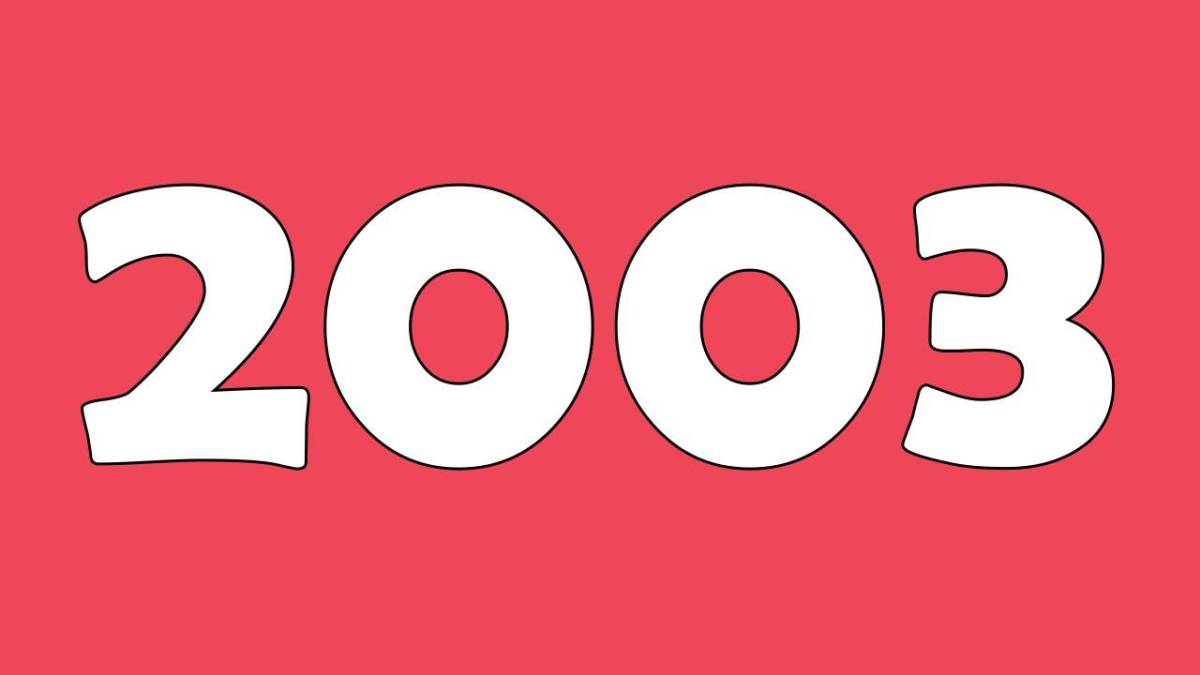Step back in time, just a little, to the year 2003. It was a moment when the internet felt different, still growing, with communities forming in their own unique ways. For many, this period held a special kind of hidden world, a digital landscape where things were being built, shared, and fixed by people just like us. This particular time, which we are calling the 2003 underworld, was full of interesting projects, technical puzzles, and stories that might feel familiar even now. It was, in a way, a place where many different threads of online life came together, often without much fanfare.
You see, a lot was happening behind the scenes. People were getting together to bring old favorites back to life, like those classic cartoon series we all remember. There were also folks busy putting together tools for creative projects, building platforms for games, and even trying to figure out tricky computer problems that popped up. It was a time when help for these things often came from fellow enthusiasts, people who just wanted to share what they knew or what they had made. This informal network, honestly, made the digital experience quite special.
So, we're going to take a closer look at some of these pieces from that year, a bit like opening a time capsule. From community efforts to preserve digital history to the everyday tech hiccups people faced, these stories paint a picture of what online life felt like then. It's a chance to see how some of these older digital currents still influence what we do today, or perhaps, just to remember a time that was, in some respects, quite distinct.
Table of Contents
- Timothy Treadwell- A Glimpse into a Different 2003 Underworld
- Bringing Back the Past- Community Efforts in the 2003 Underworld
- Troubleshooting Tech- What Challenges Lurked in the 2003 Underworld?
- Creating Worlds- The Builders of the 2003 Underworld
- Finding Entertainment- How Did People Watch Things in the 2003 Underworld?
- Money Matters- What Was Student Loan Talk Like in the 2003 Underworld?
- Internet Lore- Where Did That Saying Come From in the 2003 Underworld?
- Everyday Fixes- Dealing with Computer Quirks in the 2003 Underworld
Timothy Treadwell- A Glimpse into a Different 2003 Underworld
When we think about 2003, sometimes a name pops up that feels a bit outside the usual digital discussions. Timothy Treadwell, who was born Timothy William Dexter, certainly lived a life that many would consider quite unconventional. He was a person who chose to spend a great deal of his time living among grizzly bears in Alaska. This choice, you know, put him in a very different kind of "underworld" than the digital one we are mostly talking about, a natural one with its own set of rules and dangers.
His story, for many, became widely known after his passing in 2003, which was a truly sad event. He had spent thirteen summers with the bears, documenting their lives and, in his own way, trying to protect them. The idea of someone living so completely immersed in the wild, so, away from human society, really captures a sense of a hidden existence, a life lived on the very edge of things. It's a reminder that the year 2003 held all sorts of stories, some digital, some deeply personal and connected to the natural world.
Personal Details and Biographical Information
Here are some basic facts about Timothy Treadwell, for those who might be curious:
| Full Name | Timothy William Dexter |
| Known As | Timothy Treadwell |
| Birth Year | 1957 |
| Death Year | 2003 |
| Primary Activity | Bear enthusiast, documentarian |
| Location of Main Work | Katmai National Park and Preserve, Alaska |
His work and life, while not directly tied to modding or tech support, certainly represent a unique kind of exploration and dedication from that very same year, showing how varied experiences could be. It's almost like a different side of the 2003 underworld, a more wild and untamed one, if you will.
Bringing Back the Past- Community Efforts in the 2003 Underworld
Think about your favorite old TV shows, the ones you watched as a kid. For many, there's a strong desire to see them preserved, perhaps even improved for modern viewing. That's where community efforts truly shine. We saw this with projects inspired by many other restoration efforts of shows, like those on Reddit, and older upscales of a particular series, too. People wanted to bring back the Teenage Mutant Ninja Turtles (2003) cartoon in a new, cleaner way. This kind of work, you know, takes a lot of care and passion.
These groups of people, often working together online, put in countless hours. They share their methods, their tools, and their progress. It's a bit like a collective memory project, ensuring that beloved content from the past doesn't just fade away. This drive to preserve and improve, in some respects, is a very human thing, showing how much we value the things that bring us joy from earlier times. It’s a quiet but persistent part of the 2003 underworld, where fans became keepers of history.
The spirit of these restoration projects is something quite special. It's not about making money or getting famous; it's about a shared love for something. These efforts show how powerful a group of dedicated individuals can be when they put their minds to something they care about. This commitment to keeping the past alive, you know, makes a real difference for everyone who loves these older shows. It’s a truly cool aspect of the broader 2003 underworld, if you ask me.
Troubleshooting Tech- What Challenges Lurked in the 2003 Underworld?
Back in 2003, getting older games to run could be a real head-scratcher. Many folks tried to use emulators, like MAME, to play arcade classics on their home computers. But, as a matter of fact, it wasn't always smooth sailing. Someone might say, "I installed MAME 2003 Plus core for RetroArch, but nothing happens when I try playing a file." This was a pretty common experience, to be honest.
Then, the next step would often be trying other versions of the software. "I tried all other MAME cores in RetroArch, but none seem to be working," someone else might mention. This kind of trial and error, you know, was a big part of the tech experience back then. It wasn't always as simple as clicking a button and having everything just work perfectly. These little technical roadblocks were, perhaps, a common part of the 2003 underworld for anyone trying to enjoy retro gaming.
The community aspect here was absolutely vital. When something didn't work, people would turn to forums, message boards, and chat rooms for help. Others who had faced similar issues would share their solutions, or at least offer ideas to try. This shared problem-solving, honestly, helped many people get their games up and running. It really shows how people supported each other through the trickier parts of the digital 2003 underworld.
Creating Worlds- The Builders of the 2003 Underworld
For those with a creative spark, 2003 offered some interesting tools to build their own digital experiences. Take RPG Maker 2003, for example. It was a popular program that let people create their very own role-playing games, even if they didn't know much about coding. Someone might say, "I've compiled a lot of tools for RPG Maker 2003," which points to the vibrant community around it. This was, you know, a big deal for aspiring game makers.
Beyond the basic program, there were also resources and patches that made it even more powerful. "Also are links for resources and the Maniac Patch which increases the functionality significantly of the engine," someone might add. These additions allowed creators to do more, to push the boundaries of what the software could do. It was, in some respects, a time when individual creators could really make their mark without needing huge budgets or teams. This creative energy was a key part of the 2003 underworld, allowing anyone to build stories and adventures.
The sharing of these tools and resources really helped foster a sense of collective creation. People weren't just making games; they were also helping others make games. This collaborative spirit, you know, meant that if you had an idea, there was a good chance someone in the community had already made a tool or a resource that could help you bring it to life. It was a very supportive environment for digital artistry within the 2003 underworld.
Finding Entertainment- How Did People Watch Things in the 2003 Underworld?
In 2003, watching anime or other shows online wasn't quite as straightforward as it is today. There weren't many official streaming services, so people often looked for other ways to catch their favorite series. A common question might be, "What sites do you guys use to watch anime for free with very little ads and safe?" This was a real concern for many, as a matter of fact.
Finding reliable and safe places to watch things could be a bit of a hunt. People would share tips and recommendations with each other, trying to avoid sites that were full of pop-ups or, worse, something harmful. It was a time when the internet was still figuring itself out, and users had to be a little more careful about where they clicked. This search for good, clean entertainment was, you know, a common thread in the digital 2003 underworld.
The community played a big part in this, too. If someone found a good site, they'd often share it with others on forums or in chat rooms. This informal network of sharing helped people navigate what was, at times, a pretty messy online landscape. It highlights how much people relied on each other for information and guidance when it came to finding digital content, a very practical aspect of the 2003 underworld.
Money Matters- What Was Student Loan Talk Like in the 2003 Underworld?
While a lot of the "2003 underworld" involved digital pursuits, real-world concerns were, of course, always present. One big topic for many young people was student loans. Going to college often meant taking on debt, and figuring out how to manage that was a common challenge. Reddit, even back then, served as a "hub for advice, articles, and general discussion about getting and repaying student loans." This kind of practical information was, you know, just as important as any game or modding project.
The discussions around student loans weren't always easy. People shared their struggles, their strategies, and their worries about the future. It was a space where individuals could feel less alone in facing a significant financial burden. The conversations often included tips on budgeting, finding scholarships, and understanding the different repayment options. This practical side of life, you know, existed right alongside the digital explorations of the time.
It's interesting how these different kinds of conversations co-existed within the online spaces of 2003. You could be talking about a technical glitch one moment and then, just a little later, about serious financial planning. This blend of topics really shows the full picture of what people were dealing with and talking about online during that period. It was, in some respects, a very honest reflection of people's lives, both online and off, within the 2003 underworld.
Internet Lore- Where Did That Saying Come From in the 2003 Underworld?
The internet has a funny way of creating its own little pieces of lore, phrases or memes that just stick around. Sometimes, you hear something so often that you start to wonder where it even began. For example, "Does anyone know where the 'yup that's me, you probably wonder how I got here' actually originated from?" This kind of question pops up a lot when a phrase becomes really popular. It's almost like trying to trace a whisper through a crowded room.
These sayings often start small, perhaps in a specific video, a forum post, or a particular show, and then they spread like wildfire. They become part of the shared language of the internet, used in jokes, comments, and even everyday conversations. Trying to pinpoint the exact origin can be quite a task, especially when things spread so quickly. This quest for origins is, you know, a fun part of internet history, a bit like digital archaeology.
Understanding where these bits of internet culture come from gives us a better sense of how online communities evolve and communicate. It shows how a simple phrase can take on a life of its own and become something much bigger than its original context. These little pieces of shared understanding were, in a way, part of the fabric of the 2003 underworld, helping people connect through humor and shared references.
Everyday Fixes- Dealing with Computer Quirks in the 2003 Underworld
Computers, even back in 2003, could be a bit temperamental. Sometimes, things just wouldn't work the way you expected, and you'd have to do a little detective work to figure out why. For instance, someone might discover, "For me there was a process running in the event viewer called 'cp'." Finding these hidden processes, you know, was often the first step in solving a problem that seemed really stubborn.
The satisfaction of finding a solution was always pretty good. "Once I killed the process I was able to delete the PC App Store folder," someone might explain. This kind of hands-on troubleshooting was a regular part of owning a computer back then. It wasn't always about grand projects or deep discussions; sometimes it was just about making your own machine work properly. These small victories, honestly, made a big difference in daily computer use.
And when you found a fix, you often shared it. The community aspect came into play even with these everyday quirks. Someone might reply with "more replies datcherw11 • how," asking for more details on how the fix was done. This exchange of practical advice, you know, was a constant thread in the digital landscape. It shows how people helped each other through the minor frustrations of technology, making the 2003 underworld a more manageable place for everyone.
This look back at 2003 has touched on various aspects of life, from preserving old cartoons and fixing computer issues to navigating student loans and exploring unique personal journeys. It's a snapshot of a time when digital communities were truly shaping how people interacted with technology and each other. The "2003 underworld" encompasses these diverse experiences, showing how a year can hold so many different stories, both online and off.


